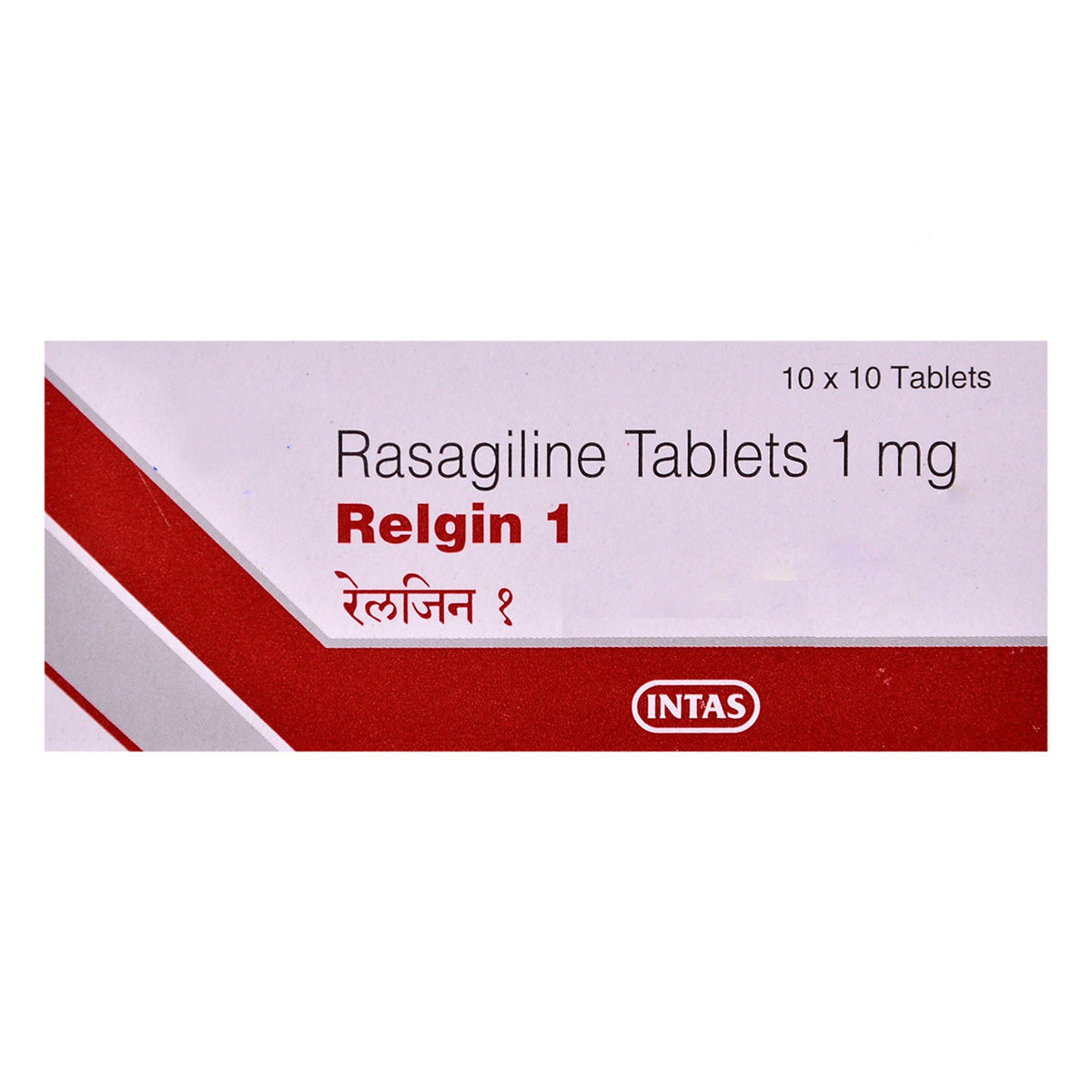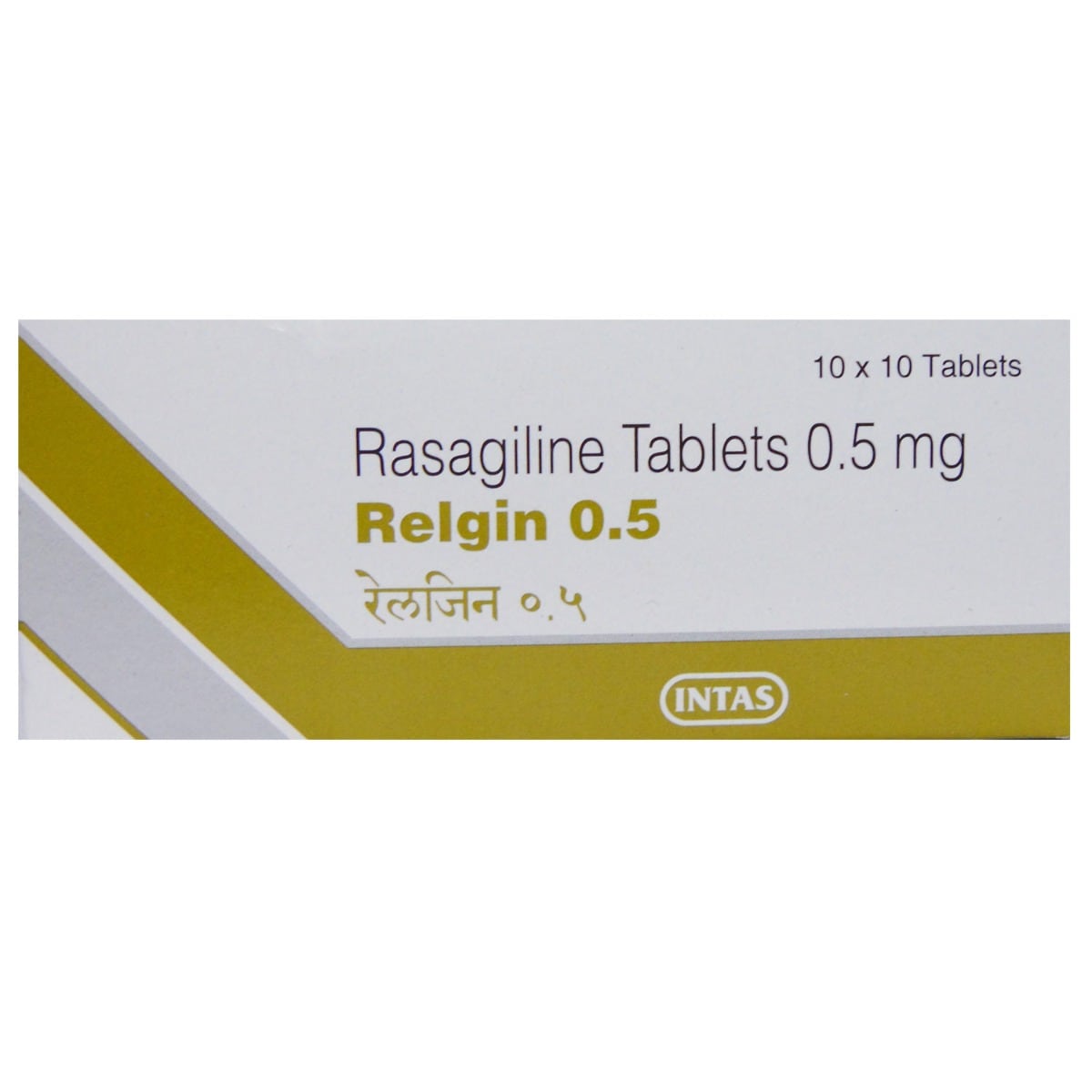Rasagiline
About Rasagiline
Rasagiline is used alone or in combination with another medication to treat the symptoms of Parkinson's disease. Parkinson's disease is a condition in which regions of the brain gradually weaken over time. Parkinson's disease symptoms include involuntary shaking of certain body parts (tremors), sluggish movement, and stiff and inflexible muscles.
Rasagiline contains Rasagiline. It works by increasing the amount of dopamine, a chemical messenger needed to control movement in the brain. Thus, it helps treat the symptoms of Parkinson's disease.
Use Rasagiline as advised by your doctor. The most common side effects of Rasagiline are feeling sick, headaches, abdominal pain and high blood pressure. Most of the side effects of Rasagiline do not require medical attention and resolve gradually over time. However, if the side effects persist or worsen, please consult your doctor.
If you are known to be allergic to Rasagiline or any other medicines, please inform your doctor. If you are a pregnant woman or nursing mother, do not consume Rasagiline without first consulting your doctor. Inform your doctor before using the Rasagiline if you have a history of hypotension, hypertension, liver or kindly impairments.
Avoiding alcohol is recommended to rule out any possibility of side effects like dizziness. Rasagiline is not recommended for children below 12 years of age.
Uses of Rasagiline
Medicinal Benefits
- Helps manage symptoms of Parkinson’s disease, such as stiffness, tremors, and slowed movements.
- Improves movement control and coordination in patients with Parkinson’s disease.
- It can be used alone in early stages or with levodopa in advanced stages of Parkinson’s disease.
- Helps reduce “off” periods (when medication effects wear off) in patients on levodopa therapy.
- Enhances overall daily functioning and mobility.
- May help improve mood and reduce fatigue associated with Parkinson’s disease.
Directions for Use
- Take Rasagiline with or without food as advised by your doctor.
- It is advised to take Rasagiline once daily; however, follow the doctor’s recommendation regarding the dosage and duration.
- Swallow Rasagiline as a whole with a glass of water.
- Do not crush, break, or chew it.
Side Effects of Rasagiline
- Feeling sick
- Headaches
- Lightheadedness
- Abdominal pain
- High blood pressure
- Vomiting
- Joint or neck pain
- Heartburn
- Constipation
- Diarrhoea
- Loss of appetite
- Fever
- Lack of energy
- Sleepiness
Drug Warnings
- Before taking the Rasagiline, let your doctor know about all your allergic or hypersensitivity reactions to medicines or food.
- Keep your doctor informed about your health condition and all your medications before taking Rasagiline to rule out any side effects.
- Inform your doctor if you are suffering from hypotension, psychosis (psychotic disorder) and hepatic impairment.
- Limit or avoid the consumption of caffeine or alcohol intake.
Drug Interactions
Drug-Drug interactions: Rasagiline may interact with other medicines and may increase the side effects of the drug. Consult with the doctor if you are already taking any medicine or prescription medicine. Some of them include pain killers (amitriptyline, tramadol), antidepressant medications (sertraline, bupropion, mirtazapine), and selegiline (a drug used to help control the symptoms of Parkinson's disease.
Drug-Food Interactions: Cut down the consumption of alcoholic beverages.
Drug-Disease Interactions: Rasagiline may interact with disease conditions, including hypotension, hypertension, heart conditions, mental/mood disorders and renal or hepatic (liver) conditions.
Drug-Drug Interactions Checker List:
Safety Advice

Alcohol
unsafeLimit or avoid alcohol consumption; alcohol consumption makes you feel sleepy or tired.

Pregnancy
consult your doctorRasagiline is not recommended for use in pregnancy unless clearly necessary. So, inform your doctor if you are pregnant or suspect pregnancy before taking this medicine. Your doctor will weigh the benefits and potential risks before prescribing Rasagiline.

Breast Feeding
consult your doctorRasagiline should not be used in nursing mothers unless clearly necessary. So, inform your doctor before taking this medicine if you are a nursing mother. Your doctor will weigh the benefits and potential risks before prescribing Rasagiline.

Driving
unsafeRasagiline may cause a reduction in mental attentiveness; hence, avoid driving or using machinery.

Liver
consult your doctorLet your doctor know before taking Rasagiline if you have liver disease or have a history of liver impairment/disorder. Your doctor will prescribe only if the benefits outweigh the risks.

Kidney
cautionTell your doctor before taking Rasagiline if you have kidney problems or a history of liver diseases/conditions. Your doctor may adjust your dose depending on your current kidney conditions.

Children
unsafeRasagiline is not recommended for use in children under 18 years of age.
Habit Forming
Diet & Lifestyle Advise
- A balanced diet rich in vitamins, fibre, and minerals, such as grains and leafy greens, is essential for improving symptoms of Parkinson's disease. In addition to this food, one should include dairy products, protein-rich foods such as meat and beans, and solid fats such as nuts, olive oil, fish, and eggs in their diet. However, limit your sugar intake.
- Constipation is a common complaint among Parkinson's disease patients. Drinking more liquids and increasing fibre intake can help you overcome this problem.
- Parkinson's disease is often associated with decreased bone density. Taking calcium and vitamin D supplements may help in this regard. However, before taking any supplements, consult with your doctor.
- One should drink plenty of water, as people with this disease often feel dehydrated.
Patients Concern
Disease/Condition Glossary
Parkinson's disease (PD): It is also known as a movement disorder that mainly affects a person's ability to perform regular activities. It is a chronic and progressive disorder that can worsen with time if proper treatment is not provided at the right time. Common symptoms include tremor at rest, limb stiffness, slowed movement, difficulty with movement or walking, and impaired balance. Other motor symptoms include trouble in solving problems, small handwriting, stooped posture, etc. This disease also affects the brain's ability to work properly, such as sleep disturbances, reduced ability to smell, depression, fatigue, and anxiety. However, the symptoms of this disease vary from person to person. Certain neurons in the brain are responsible for producing dopamine. This neurotransmitter helps regulate body movement. Loss of dopamine is supposed to be the primary reason for the occurrence of Parkinson's disease.
FAQs
Rasagiline is used alone or in combination with another medication to treat the symptoms of Parkinson's disease.
Rasagiline contains Rasagiline, which works by increasing the amount of dopamine, a chemical messenger needed to control movement in the brain. Thus, it helps to treat the symptoms of Parkinson's disease.
Take Rasagiline medicine as prescribed by your doctor. Take one dose on a regular basis. Try to take the Rasagiline at the same time of day every day, as this will assist you in making sure to take them.
It is possible that a person may face unsteadiness or dizziness, particularly when they get up from a lying or sitting position while on treatment with Rasagiline. Getting up slowly may help.
A person dealing with Parkinson's disease can notice an improvement in their condition after some weeks of starting the treatment.
Do not double the dose to make up for a missed dose. You can skip the missed dose and take the next dose at the standard time the following day.
To ensure safe and effective treatment, take Rasagiline orally once a day, with or without food, and at the same time every day to maintain a consistent therapeutic level. Always follow the instructions on your prescription label carefully, and don't hesitate to ask your doctor or pharmacist to explain any part you don't understand. Adhere to these guidelines to take Rasagiline effectively and safely.
Rasagiline is generally well-tolerated, and most people taking the medication do not experience significant side effects. While some individuals may encounter mild side effects such as headaches, nausea, abdominal pain, or high blood pressure, these effects are usually temporary and resolve on their own over time. If you do experience any side effects, rest assured that your doctor is available to provide guidance and support to ensure your comfort and well-being.
Rasagiline falls into the category of Monoamine Oxidase B (MAO-B) inhibitors, a specific class of medications that work by blocking the action of the enzyme monoamine oxidase B (MAO-B) in the brain. This medication is specifically used for the treatment of Parkinson's disease, helping to manage its symptoms and improve the quality of life for those affected.
Yes, smoking can reduce the levels of Rasagiline in the blood, potentially making it less effective. Please tell your doctor if you smoke or intend to stop smoking while taking Rasagiline.
To maximise the benefits of Rasagiline, it's essential to be mindful of your diet. Focus on avoiding foods rich in tyramine, such as aged cheeses, fermented foods, red wine, soy products, and certain fruits like avocado and bitter orange, as they can cause a sudden increase in blood pressure. Additionally, avoiding tobacco is a great idea, as it can reduce its effectiveness. By following your doctor's personalised dietary recommendations, you'll be well on your way to getting the most out of your treatment.
Rasagiline is a valuable treatment option, and while it's essential to acknowledge potential risks, it's also important to emphasise proactive measures for minimising them. There is a possible link between Rasagiline and an increased risk of melanoma, a type of skin cancer. However, you can significantly reduce this risk by being vigilant about your skin health. Regularly monitor your skin for any unusual changes, and don't hesitate to consult your doctor if you notice anything suspicious. Additionally, scheduling regular dermatological check-ups while using Rasagiline can provide added peace of mind and catch any potential issues early.
Rasagiline may cause low blood pressure when standing (orthostatic hypotension), leading to dizziness or light-headedness, affecting your ability to drive or operate heavy machinery. If you experience these symptoms, avoid driving unless you are fully alert.
Fainting after getting up from bed may be due to low blood pressure (orthostatic hypotension), a possible side effect of Rasagiline. If you experience this, sit up slowly before standing and stay hydrated to reduce the risk. Please consult the doctor if this symptom persists or worsens.
Rasagiline may interact with certain cold and flu medications, including those containing decongestants like pseudoephedrine or phenylephrine, which can raise blood pressure. Therefore, please consult your doctor before taking cold and flu medications with Rasagiline to ensure safety.






